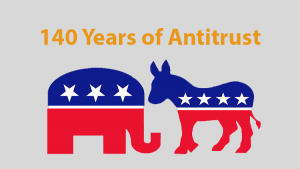Saturday, December 14, 2019
The Federal Reserve's Secret Quantitative Easing
The Federal Reserve has went into another round of quantitative easing, but outside of some financial news sources, the press seems to be ignoring it. The Wall Street Journal reported on December 6th that the Fed is increasing its balance sheet to $4.07 trillion dollars. That is putting the balance sheet back to the levels the Fed reported it needed to pull the United States out of the credit crisis created by the housing bubble.
As a quick reminder, quantitative easing is when the Federal Reserve creates excess money to stimulate a shrinking economy and avert a recession. Nobody in the mainstream has been reporting a shrinking economy or looming recession. So why the record easing?
The main reason is that the economy is not humming along as reported. As seen a couple of months ago in A Conscious Conservative, the money market system locked up completely in September. The Federal Reserve had to take immediate action to stop interest rates from going above 10%. Another reason is that the Federal Reserve has kept its primary interest rates so low that they have nowhere to go but up. If they cut them 1/2 % as often as they wanted, the interest rates would be negative by now. A third reason is that the stock market is in its longest bull run in history and people are afraid of what is going to happen when it stops. Stock prices have not been justified by company earnings for most stocks for at least ten years now. It is only the free flow of money that is keeping the market afloat.
How does this easing affect inflation? It doesn't if you are free to calculate inflation using the techniques of the Federal Reserve. Prices are actually pretty stable unless you have to buy food, fuel or housing, People who eat, put gas in their vehicles and pay rent have actually seen a substantial increase in prices over the last 10 years. However, according to the Federal Reserve, the decrease in price for an iPhone 6 more than makes up for that.
Sunday, November 24, 2019
States Fight to Keep Dem/Rep Rigging of Presidential Elections

The Supreme Court has decided to take up an issue that goes to the heart of the United States election process. There have been conflicting rulings, one by a State Supreme Court and another by a Federal Court of Appeals as to whether the votes of presidential electors belong to the electors themselves or to the states.
In the case at hand, the states have tried to penalize the so-called "faithless electors" who voted their conscience in the 2016 election. The appeals are coming from the electors in the State of Washington, who wish not to be penalized, and the State of Colorado, who lost its bid to penalize faithless electors.
23 states have asked the Supreme Court to rule in favor of the states controlling the electoral vote. What this means in reality is that the Republican and Democratic parties wish to keep control of the electoral vote. Since all states but Nebraska and Maine use a system where people vote for a slate of electors that belong to the same party, there is little opportunity for someone outside of the party establishment to become an elector. If you take away an elector's ability to vote in the way they choose, the power monopoly is assured.
A Conscious Conservative believes that electors should be selected without regards to political party membership. Electors should also vote for the candidate which they believe will best serve in the office. No. 68 of the Federalist Papers states that selecting the president should require that "every practicable obstacle should be opposed to cabal, intrigue or corruption." Unfortunately for the United States, the Republican and Democratic parties have become the cabals about which the Founders warned and 23 states are now asking the Supreme Court to condone the corruption.
Monday, November 11, 2019
Texas Voters Enact Income Tax Ban

On November 5th, Texas voters approved a constitutional ban on the personal income tax. This comes at an important time, because other no tax states like Nevada and Alaska have recently had calls to initiate an income tax.
The Texas initiative does not completely ban a future income tax. However, it puts forth a procedure where a vote of 2/3 of both houses plus a majority vote of the people is required to enact a personal income tax. 74% of Texas voters approved the restriction on the income tax.
A Conscious Conservative believes that the rest of the United States should take the lead of Texas. It is past time to repeal the 16th Amendment. More about the proposition can be found here-- Texas Proposition 4--Ballotpedia
Monday, November 4, 2019
Woman Goes Up A Tree To Protest Eminent Domain

In Columbia, Missouri, a group of citizens got together to preserve a section of old growth forest. Called It's Our Wild Nature, the organization purchased 37 acres of forest. The City of Columbia decided that they could do a better job of protecting the forest. They used eminent domain to take the forest from the non-profit.
How will Columbia protect the forest? They are going to cut down the trees. Only government could come to the conclusion that cutting down trees is the best way to preserve a forest. The plan is to turn the nature preserve into a series of urban hiking and biking trails.
So one lone woman named Sutu Forte' is going up a tree in protest. She is refusing to move until she goes to talk to the Columbia Mayor and gets a promise to delay construction. The eminent domain case is still in court. However, the city's right to take the property is not in dispute. What is disputed is that the city does not wish to pay fair market value for the land.
As of the time I write this, Forte' has been up the tree for four days. She has been ordered by a court to come down before the end of today. A Conscious Conservative hopes that others will take up her fight.
Saturday, October 19, 2019
The Day Money Market Interest Hit 10%

The lending interest in the Money Market hit 10%. This was not some anti-inflation movement in the 1980s. It was just last month, September 2019. It didn't last long and didn't get passed to consumers in their money market accounts. It did send reverberations throughout the banking world. Banks in the United States basically ran out of money. The Federal Reserve of New York pumped $125 Billion into the system to restore liquidity.
From the lack of headlines, you would think this is something which happens everyday. It wasn't. Banks don't usually run out of money. $125 billion is still a lot of money. It is the most the Feds have ever released in a quick,emergency fashion.
The suggestions for going forward from this event are more concerning. Historically, banks are only allowed to count money as cash reserves. That is probably why they are called "cash reserves." However, there is allegedly a movement afoot to allow banks to count bonds, specifically US Treasuries, as cash reserves. That will allow banks to lend even more money than currently. If people thought that the credit crisis of the late 2000s was bad, they haven't seen anything yet. If banks are allowed to lend more based on holdings of Treasury bonds and then run into a cash crunch, the logical step will be to cash those bonds. That puts the entire US deficit structure at risk. It could make Treasury bonds near worthless or require the Treasury to put the printing presses on overdrive to pay off the debt.
The United States government has never defaulted on Treasury bonds. If the banks start counting them as cash, that day may come.
Sunday, October 6, 2019
Maine Plows Forward With Ranked Choice Voting

The Maine legislature voted to make it the first state in the United States to use ranked choice voting for presidential electors in general elections. The 2020 election will be the first in which Maine voters will choose their presidential electors in order of preference.
In Maine's version of ranked choice voting, voters rank the candidates from the one they like best to the one they like least. If no candidate gets more than 50% of the vote, the candidate with the lowest number of first ranked votes is eliminated and the totals of those voters second choices are counted as first choices in the vote totals. This continues until one candidate gets more than 50% of first and second choice votes.
The hopes of proponents is that ranked choice voting will stop voting for the "lesser of two evils." If somebody really thinks an independent or alternative party candidate is best, they can vote for that candidate as their first choice and the major party candidate as their second choice without worrying about "stealing" votes from the major party candidate. In theory, there should also be more consensus, as sometimes a candidate who is the second choice of almost everyone will win over a candidate who is a plurality first choice of 30-40% of the voters. For example, it is possible that Ross Perot might have won over Clinton and Bush in a ranked choice voting environment, rather than Clinton electors winning with only 43% of the popular vote. It would have also solved the problem of 2000 Florida presidential election.
A Conscious Conservative is watching this development. Although there is guarded optimism, it is believed that Republicans and Democrats can develop a way to rig the ranked choice system also. Maine is one of only two states that does not select a statewide slate of electors. We will see if Maine selects any electors that are not pledged to the Republican or Democratic Party in 2020.
Sunday, September 29, 2019
Is Republican/Democratic Party Collusion Violating Antitrust Law

According to the Federal Trade Commission website Antitrust Laws--Federal Trade Commission The Sherman Antitrust Act of 1890 outlaws any "monopolization, attempted monopolization, or conspiracy or combination to monopolize."
In a piece written for The Libertarian Republic , William L. Kovacs argues that Sherman and other antitrust legislation applies to the conspiracy created by the Republican and Democratic Parties against alternative party and independent candidates.
Kovacs gives a brief description of why antitrust applies and why common arguments against antitrust made by the two major parties are invalid. He outlines the main legal hurdle as showing how the major parties affect commerce, as most antitrust laws are concerned with restraint of commercial trade. A Conscious Conservative believes that with the current state of government meddling in markets, this should not be too difficult to show. The main hurdle will be that almost all judges are aligned with either the Republican or Democratic Party. I wonder how judges would feel about that as evidence that the two party system is an illegal conspiracy?
Subscribe to:
Posts (Atom)
-
William F. Buckley Jr., the founder of National Review and a prominent conservative intellectual, had a profound impact on American politica...
-
In the intricate dance of democracy, one of the most nefarious partners to emerge in recent centuries is gerrymandering. Picture this: a sha...
-
In The Road to Serfdom, Nobel Prize winning economist Friedrich Hayek warns against the inevitable failures of central planning and if favor...
ARE YOU A CONSCIOUS CONSERVATIVE?
You may be A Conscious Conservative if you believe: No person or government has a right to take or use a person's property without t...



